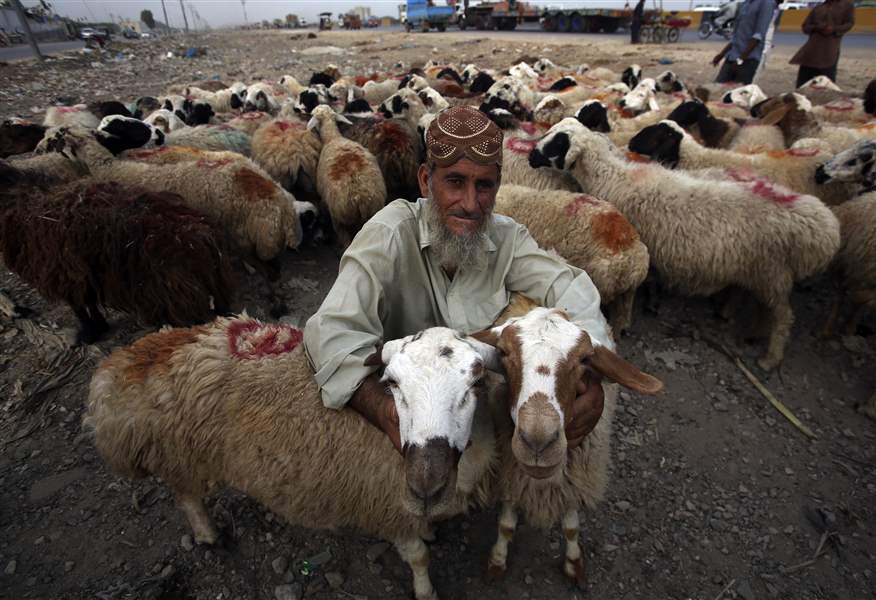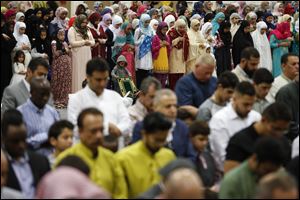
Eid al-Adha celebrates sacrifice with meaty donations
8/18/2018
An Afghan refugee vendor waits for customers to sell his sheep at cattle market set up for the upcoming Muslim festival Eid al-Adha in Karachi, Pakistan, Thursday, Aug. 16, 2018.
ASSOCIATED PRESS
God asked Abraham to sacrifice his son. Abraham steeled himself to comply.
It was a test of obedience that Abraham passed, his reward being that a ram, not his son, fulfilled the intended sacrifice.
Muslims recall this scriptural story in a particular way on Eid al-Adha, also known as the Feast of the Sacrifice, which this year falls on Tuesday.

Men, women and children pray as area mosques celebrate last year’s Eid al-Adha at the SeaGate Convention Centre. The annual gathering for prayers will be at 9:45 a.m. Tuesday.
Eid al-Adha is among the holiest days in Islam, its date coinciding with those of hajj, the annual pilgrimage to Mecca that millions undertake each year.
Locally, adherents celebrate with prayer and festive celebration, notably in community gatherings that are expected to draw thousands to the Islamic Center of Greater Toledo and the SeaGate Convention Centre this year. Prayers begin at 10 a.m. at the Islamic Center, 25877 Scheider Rd., Perrysburg Township, and at 9:45 a.m. at the convention center, 401 Jefferson Ave., on Tuesday. Children’s activities, food, and fellowship follow at each.
Often, adherents mark the day in a less visible way too: They donate meat to those in need.
“This is an an integral part of Eid al-Adha,” said Rehana Ahmed, a volunteer with the Islamic Food Bank of Toledo, explaining the roots of the tradition in the story of Abraham and Ishmael. “It is that re-enactment.”
Dr. S. Zaheer Hasan, spokesman for the the Islamic Society of Northwest Ohio, spoke similarly of its symbolism and its ties to to the central story of Eid al-Adha.
“When people sacrifice an animal,” he said, “that’s a symbolistic gesture of the main theme: Am I willing to sacrifice everything for God?”
The tradition is known as udhiyah in Arabic or qurbani in Persian and Urdu. It calls for the meat of a sacrificed animal to be donated three ways – one-third to family, one-third to friends, and one-third to those in need – although, in practice, Mrs. Ahmed said, many allocate the entirety to those in need.

An Afghan refugee vendor waits for customers to sell his sheep at cattle market set up for the upcoming Muslim festival Eid al-Adha in Karachi, Pakistan, Thursday, Aug. 16, 2018.
While there are many ways to fulfill this tradition, practicality — especially locally — leads many to fulfill it by writing a check; they leave the sacrifice to appropriately equipped butchers.
Agencies such as Islamic Relief USA, United Muslim Relief and, locally, the Islamic Food Bank of Toledo, run programs leading up to Eid al-Adha that specifically facilitate these financial donations, enabling donors to “pay” for all or part of an animal that a local butcher, in turn, prepares and returns to the agency for distribution to those in need.
Islamic Relief USA and United Muslim Relief distribute internationally, reaching hundreds of thousands of vulnerable communities, including refugee camps and disaster-affected areas. Islamic Relief estimates that it will reach 750,000 people in 34 countries in 2018.
The Islamic Food Bank of Toledo, as with all of its year-round initiatives, looks more locally in its program for Eid al-Adha. The nonprofit expects to distribute between 1,000 and 1,500 pounds of meat to Muslims and non-Muslims in the weeks following Eid al-Adha, said Mohamad Orra, who is the food bank’s treasurer. It’s packaged in 10-pound bags that are distributed to the needy through multiple channels rather than at one distribution event.
While the symbolism of the tradition is important, the donations themselves can have a major impact. To local recipients whose diets might sway toward the canned foods readily available at local food banks, meat can be a much appreciated protein, Mrs. Ahmed said.
And, internationally, Islamic Relief USA and United Muslim Relief note that the meat distributed in line with Eid al-Adha is often the only time that a recipient might eat meat all year.
Mr. Orra estimated that the local program has been active under the Islamic Food Bank of Toledo for at least eight years, in which time it’s become a convenient option for families who might previously have looked to their local mosque to make udhiyah arrangements.
It’s one of several initiatives at the food bank, which also distributes hot meals during Ramadan.
The nonprofit last year launched a mobile food bank that brings hot meals to two locations, Toledo Masjid Al-Islam, 722 E. Bancroft St., and Helping Hands of St. Louis, 443 Sixth St., on the second Saturday of each month; the mobile food bank stops at the mosque at 1 p.m. and the charity at 1:30 p.m.
While there’s certainly value in programs that distribute internationally, Mr. Orra said, to keep their own distribution local is in line with the mission of the Islamic Food Bank of Toledo.
“We want to take care of our neighbors first,” he said.
The tradition is also visible locally at the Sultan Club, a social and cultural club in Toledo whose members have ties to Sultan Yacoub, Lebanon. The club hosted a benefit dinner earlier this month, in which diners were invited to fill out donation forms through United Muslim Relief.
The Eid al-Adha tradition has evolved significantly from its dramatic roots in scripture, where the patriarch’s willingness to sacrifice even his son for God continues to speak to worshipers today. Imams are likely to preach on the theme on Tuesday.
Mrs. Ahmed and Dr. Hasan emphasized that it’s that message, really, that remains at the heart of uddiyah.
“The main thing is the spirit,” Dr. Hasan said. “This is a reaffirmation every year that I should be ready to sacrifice everything I have.”
Contact Nicki Gorny at ngorny@theblade.com or 419-724-6133.